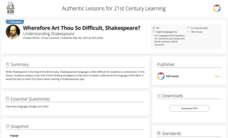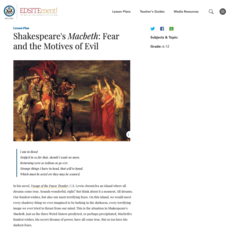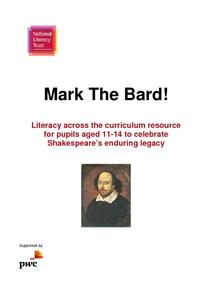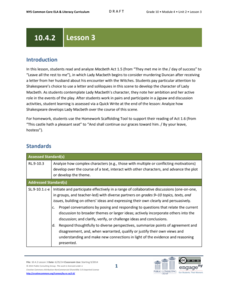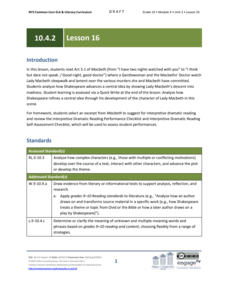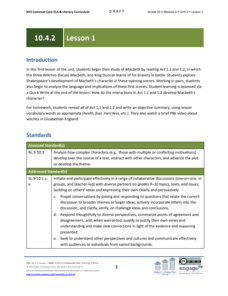National Endowment for the Humanities
Shakespeare's Macbeth: Fear and the "Dagger of the Mind"
High schoolers read and analyze Shakespeare's play, 'Macbeth.' They analyze how Shakespeare uses metaphors, imagery and dramatic cues to demonstrate Macbeth's response to fear, and perform without words a scene dramatizing Macbeth's...
Curated OER
Analyzing Atmosphere: Macbeth Murder Scene and Dagger Speech
Shakespeare's Macbeth (Act II, Scenes I and II) lacks explicit details of the murder of King Duncan, yet the author creates an atmosphere that allows us to visualize the event. Readers interpret the "Dagger Speech" by writing stage...
Shakespeare Uncovered
“Speak, I Charge You”: Macbeth On Your Feet, Not In Your Seat
“Is this a dagger which I see before me . . .” As part of a study of Macbeth, class members engage in a series of activities that get them up and moving. Individuals practice, then deliver, a line from the Scottish play. The entire class...
K20 LEARN
Wherefore Art Thou So Difficult, Shakespeare? Understanding Shakespeare
'Tis not easy to understand the language of the Bard! But, hark! Fret not! With the assistance of this joyous lesson, young players learn how to translate Shakespeare's English into modern language. Groups examine passages from Julius...
Curated OER
Shakespeare's Macbeth
After reading Act II of The Tragedy of Macbeth, give your class this prompt to complete. One other question is listed along with information regarding the divine right of kings. A full plan is not written out here, but the prompt is a...
National Endowment for the Humanities
Shakespeare's Macbeth: Fear and the Motives of Evil
High schoolers use an online search engine (or a printed concordance) to locate passages that highlight Macbeth's response to fear and his descent into evil. They analyze the motives of Macbeth's increasingly desperate and evil actions.
Curated OER
Macbeth News Broadcast
Here is an authentic assessment task for Shakespeare's Macbeth. Young literature scholars prepare, perform, and record a news broadcast about the major events in the play. For example, groups may choose to report on the death of Lady...
Curated OER
Shakespeare's Macbeth: Fear and Motives of Evil
Learners complete play and vocabulary analysis for William Shakespeare's Macbeth. In this Macbeth analysis lesson, students use an online research engine to locate passages that highlight Macbeth's response to fear and his descent into...
Literacy Design Collaborative
Macbeth: Influence of Supernatural
Something wickedly wonderful this way comes in a lesson that focuses on Macbeth. After a close reading of the play, class members craft a literary analysis essay in which they use evidence from the text to show how Shakespeare uses the...
National Literacy Trust
Mark The Bard!
Commemorate the 400th anniversary of Shakespeare's death with a packet of cross-curricular literacy lessons and activities centered around two of the Bard's most popular plays, Macbeth and The Tempest. Class members look for evidence of...
Curated OER
Macbeth
Students explore and analyze how to approach Shakespeare and create more meaning in a variety of contexts. In groups, they imagine three witches on the heath and trying to play it straight. They study various script extracts to evaluate.
Curated OER
Lady Macbeth's Cure
Students role-play the position of Lady Macbeth's nurse. They are to create a project or service that can cure her sleepwalking. They create their own commerical to sell their product.
Curated OER
What's in a Name? Considering the Shakespeare Authorship Question
Did Shakespeare really write all that stuff? After viewing a trailer for the film, Anonymous and reading Stephen Marche’s article “Wouldn’t It Be Cool If Shakespeare Wasn’t Shakespeare?” class groups read articles about the Shakespeare...
PBS
Supernatural Shakespeare and Macbeth
"A drum, a drum! Macbeth doth come." The withered and wild witches of Shakespeare’s Scottish play launch an examination of the fantastical elements in Act I, scene iii, paying particular attention to the action, imagery,...
Curated OER
Macbeth: Denouement/Falling Action
Readers of Shakespeare explore denouement in Macbeth and track the play's falling action in Act IV, Scene 1. They complete a worksheet/table noting the content and significance of each of the three apparitions granted Macbeth by the...
Curated OER
Stomping and Romping with Shakespeare
Did you know that Green Eggs and Ham is written in iambic pentameter? Model the rhythm of language using Dr. Seuss’s tale. Direct class members to march about the room tapping their right foot on the first syllable and stomping their...
EngageNY
Grade 10 ELA Module 4: Unit 2, Lesson 3
How does Lady Macbeth's ambition help advance the plot of Shakespeare's Macbeth? Scholars explore the topic using discussion and a jigsaw activity. Next, they complete a quick write to analyze how Shakespeare develops Lady Macbeth's...
EngageNY
Grade 10 ELA Module 4: Unit 2, Lesson 6
What decisions might an author make about the structure of a play? Pupils participate in an evidence-based discussion about Shakespeare's choices in Macbeth. Next, scholars analyze the effect of Shakespeare's structural choices in Act 2,...
EngageNY
Grade 10 ELA Module 4: Unit 2, Lesson 16
How do complex characters develop throughout a text? Pupils read Act 5.1 from Shakespeare's Macbeth, which depicts Lady Macbeth's descent into madness. Using discussion and writing exercises, scholars analyze how Shakespeare develops...
EngageNY
Grade 10 ELA Module 4: Unit 2, Lesson 1
What do readers discover about a character within the first few sections of a text? Pupils begin reading Shakespeare's Macbeth and analyze the language in the first few scenes of the play. They also demonstrate understanding with a Quick...
EngageNY
Grade 10 ELA Module 4: Unit 2, Lesson 10
Is it better to be dead than to "dwell in doubtful joy," as Lady Macbeth suggests in Act 3.2 of Shakespeare's Macbeth? Using the resource, scholars work in small groups to discuss how Lady Macbeth and Macbeth begin to unravel following...
EngageNY
Grade 10 ELA Module 4: Unit 3, Lesson 5
Would Machiavelli consider Macbeth a successful ruler? Scholars ponder the intriguing question, demonstrating their knowledge of Shakespeare's Macbeth and Machiavelli's The Prince. They collaborate with peers to share their opinions,...
EngageNY
Grade 10 ELA Module 4: Unit 2, Lesson 18
Macbeth describes life as a light and a candle, suggesting it is fleeting and meaningless. Using the resource, scholars engage in an evidence-based discussion and complete a Quick Write about Shakespeare's use of figurative language in...
EngageNY
Grade 10 ELA Module 4: Unit 2, Lesson 4
Ambition, murder, nontraditional gender roles ... some problems just can't be fixed in marriage counseling. Learners discuss the relationship between Macbeth and Lady Macbeth. As a culminating activity, pupils analyze how the characters'...





